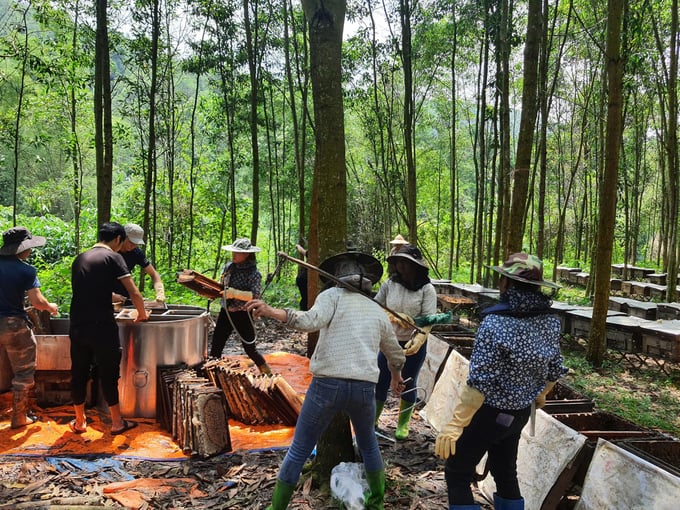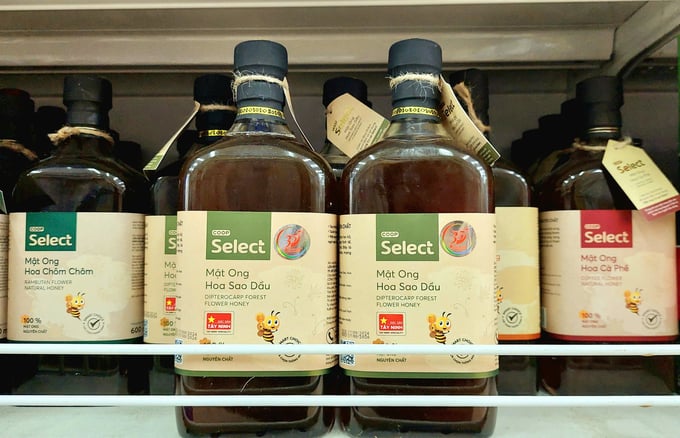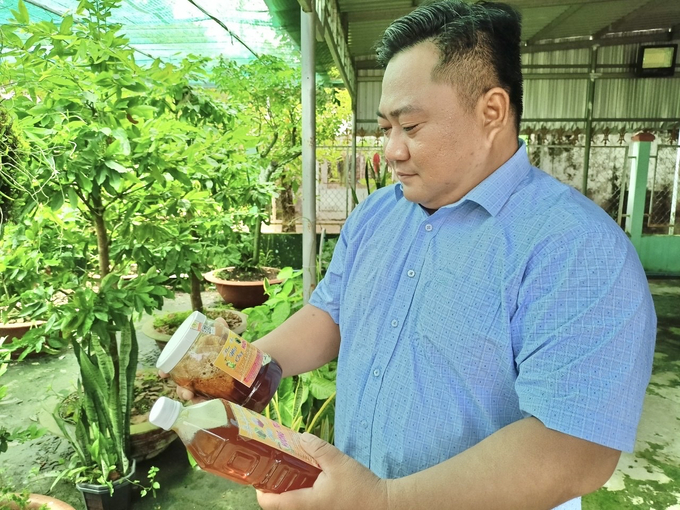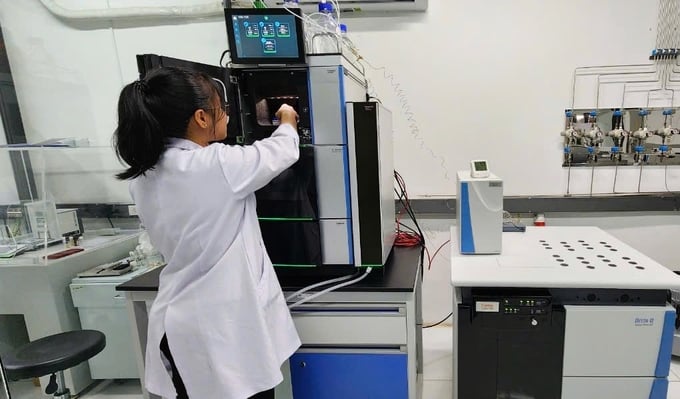November 11, 2025 | 02:20 GMT +7
November 11, 2025 | 02:20 GMT +7
Hotline: 0913.378.918
November 11, 2025 | 02:20 GMT +7
Hotline: 0913.378.918

The challenge for Vietnamese honey comes not only from the damage caused by anti-dumping taxes but also from quality control when the situation of real honey being mixed with fake honey (honey made from sugarcane) is increasingly common. Photo: KT.
In 2021, the worldwide honey market was valued at USD 8.17 billion and is anticipated to reach USD 12.69 billion by 2029, reflecting an annual compound growth rate of 5.83% from 2021 to 2029. The robust expansion in the sector is propelled by the increasing preference for organic, green products as sugar alternatives.
The Vietnam Beekeepers Association reports that the nation presently has about 40,000 beekeeping families and several honey processing and export enterprises. In 2021, Vietnam's honey output exceeded 50,000 tons per year, with exports constituting 90% of this total. Vietnamese honey companies are progressively solidifying their presence in countries such as the EU, Japan, and South Korea, demonstrating their capacity to comply with stringent export standards encompassing traceability and disease management.

The Vietnamese Honey brand has gradually affirmed its position in the EU, Japanese and Korean markets. This shows the ability to meet strict export regulations from traceability to disease records management. Photo: KT.
The principal export market for Vietnamese honey is the United States. Nonetheless, anti-dumping duties in this market have profoundly affected local enterprises. Prior to the the levy of these duties, Vietnam exported an average of 56 million liters of honey to the U.S. each year; however, in 2022, the export volume decreased to around 16 million liters, and in the initial eight months of 2024, shipments are projected to be about 20 million liters.
Mr. Dinh Quyet Tam, Chairman of the Vietnam Beekeepers Association, claimed that the honey sector had substantial potential, yet faces considerable hurdles. The obstacles arise not just from anti-dumping tariffs but also from quality control issues, since counterfeit honey (honey derived from sugarcane) is becoming more widespread in conjunction with authentic honey. If regulatory authorities fail to solve this issue, the potential for fake honey being included into export shipments may result in severe repercussions, including the possibility of Vietnamese honey facing bans in other nations.

Controlling whether honey is mixed with sugar or not is an important requirement, and requires quick testing time for businesses to make decisions on purchasing raw materials. Photo: KT.
Identifying fake honey necessitates specialist equipment advanced technology, and a proficient team of professionals to guarantee precise results. Moreover, if the quality analysis outcomes vary between Vietnam and the EU, enterprises may have substantial challenges in raw material management.
Dr. Cord Lüllmann, Managing Director of QSI Bremen and Technical Director of the Tentamus Group, asserts that for Vietnam to enhance its export market, Quality Services International GmbH (QSI) and Tentamus Vietnam, a division of the Tentamus Group, have partnered to create and manage a specialized honey testing laboratory in Vietnam (QSI Vietnam) equipped with advanced technology, guaranteeing that test results in Vietnam are consistent with those from their laboratory in Germany.
Mr. Luong Phuoc Vinh, General Director of Tentamus Vietnam, asserted that for honey exports, enterprises must ensure the quality control of each batch of raw materials. Controlling the mixing of honey with sugar is a critical necessity, and expedited testing is essential to assist enterprises in making timely procurement decisions for raw materials. Nonetheless, dispatching samples to Europe for examination is impractical due to extended shipping durations and elevated expenses.

Quality Services International GmbH (QSI) and Tentamus Vietnam under the Tentamus Group cooperate to build a specialized honey testing laboratory in Vietnam (QSI Vietnam) with modern equipment to test honey in Vietnam and other countries in the region. Photo: KT.
Therefore, the establishment of a honey testing laboratory in Vietnam, equipped with advanced technology akin to that found in German laboratories and staffed by a proficient team trained by QSI Bremen, will instill confidence in businesses regarding the consistency of raw material testing results that align with those for products exported to the EU, thereby reducing transportation expenses. Businesses may rely on the quality of raw materials in Vietnam, therefore improving their procurement capacity.
Moreover, exporting honey to the U.S. necessitates pollen analysis to confirm its geographical and botanical provenance. This parameter is presently testable just in Germany; however, Tentamus Vietnam intends to introduce this testing in Vietnam shortly
Translated by Linh Linh

(VAN) The Vietnamese tilapia industry is only in the initial stages of export, yet its growth potential remains vast. To reach further, it needs to focus on breed stock, technology, and deep processing.
/2025/11/08/3402-1-212706_176.jpg)
(VAN) Viet Nam's fruit and vegetable exports continued to reach an extremely high turnover in October. With this growth momentum, the sector is expected to set a new milestone of USD 8.5 billion in 2025.
/2025/11/08/4950-1-163820_289.jpg)
(VAN) During the 2021–2025 period, Viet Nam's agro-forestry-fishery processing industry has made remarkable progress, achieving an average growth rate of 8%/year.

(VAN) Over 80 years, Vietnamese rice has journeyed through half a century to become a symbol of knowledge, resilience, and the new nation’s agriculture stature.

(VAN) The traders estimated that the lowest price in the tender, closed on Thursday by Bangladesh's state grain buyer, to buy 50,000 metric tonnes of rice was $355.59 per metric ton CIF, liner out.

(VAN) The information shared by Dr. Ngo Xuan Nam, Deputy Director of Viet Nam Sanitary and Phytosanitary Notification Authority and Enquiry Point (SPS Viet Nam), on October 30 during a conference on food safety regulations.

(VAN) Viet Nam mainly exports raw Bat Do bamboo shoots for deep processing, so premium products appear only on dining tables in Japan and Taiwan.